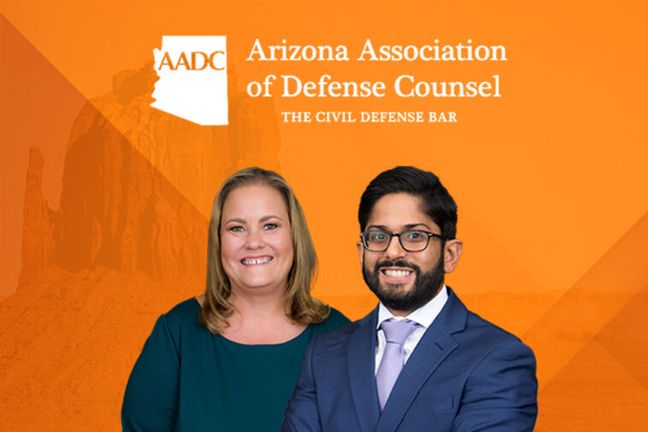There are times when terms within a contract dictate how disputes arising out of the agreement must be handled. One common requirement is the parties must arbitrate any disputes. Does this automatically mean the prevailing party will be entitled to an award of attorneys’ fees pursuant to A.R.S. §12-341.01 since the dispute arises from a contract agreement? Recently, the Arizona Court of Appeals reminded us that is not always the case.
Mark Zahler v. Swift Transportation Company, LLC, No. 1 CA-CV 22-0191 (Dec. 29, 2022)
In Zahler v. Swift Transportation, Mark Zahler entered into an agreement with Swift Transportation Company, LLC, as an independent contractor. The contract required the parties to arbitrate any dispute arising from the relationship created by the agreement. It also included the following attorneys’ fees provision:
In the event either party hereto brings an action…to collect damages of any kind for any claim that arises out of relates to the relationship created by this Agreement, the prevailing party shall be entitled to recover its costs and reasonable attorney’s fees.[i]
Mr. Zahler sued Swift for injuries he experienced on the job due to a Swift employee’s negligence. Per the contract, the case was arbitrated. The arbitrator found in favor of Mr. Zahler and awarded him damages. Even though he was the prevailing party, the arbitrator did not award Mr. Zahler attorneys’ fees and some of his costs.
Mr. Zahler filed a petition to vacate the arbitration award. Based on A.R.S. §12-3023(A)(4), Mr. Zahler argued the arbitrator exceeded his powers by failing to award attorneys’ fees and all costs. The superior court denied the petition, and Mr. Zahler appealed to the Court of Appeals.
In Arizona, superior courts may reject an arbitration award only on narrow, statutorily-enumerated grounds.[ii] The Arizona Court of Appeals reviews the lower court’s decision to confirm an arbitration award in the light most favorable to upholding the decision, and it will affirm the superior court’s ruling absent abuse of discretion.[iii] An arbitrator’s ruling as to questions of law and fact are final and will not be disturbed unless the arbitrator has purported to decide a matter beyond the scope of issues submitted for arbitration.[iv]
The Court of Appeals upheld the arbitrator’s ruling. It ruled the arbitrator did not decide an issue beyond those submitted for arbitration. The question related to the claim for fees and costs was submitted to the arbitrator because it arose out of the relationship created by the contract. When reviewing an arbitration award under A.R.S. §12-3023(A)(4), the Court of Appeals’ review is limited to whether the arbitrator decided an issue not in question. The interpretation of the contract is such an issue as a matter of law.
Upon review of the pertinent contract language, the superior court and Court of Appeals agreed it provided the arbitrator with several grounds on which the arbitrator could decline to award attorneys’ fees and costs. In Arizona, negligent tortfeasors owe a duty of care even in the absence of a contract, so an award of fees under A.R.S. §12-341.01 is not appropriate even if the contract relationship is implicated in the negligence case.[v] Also, the evidence in the subject case did not support a record substantiating the reasonableness of the fees requested.
Takeaway:
In a claim involving a contract, it is important to discuss with defense counsel the potential argument from plaintiff’s counsel to seek attorneys’ fees. While reviewing the contract terms, analyze how the terms could impact the litigation plan and scope of necessary discovery before the arbitration or trial.
Keep Reading
More by this author
Sources
[i] Zahler v. Swift Transp. Co., LLC, 1 CA-CV 22-0191, 2022 WL 17982941, at *1 (App. Dec. 29, 2022).
[ii] Nolan v. Kenner, 226 Ariz. 459, 461 (App. 2011).
[iii] RS Indus., Inc. v. Candrian, 240 Ariz. 132, 135 (App. 2016).
[iv] Id. at 135.
[v] Cf. Ramsey Air Meds., L.L.C. v. Cutter Aviation, Inc., 198 Ariz. 10, 15-16 (App. 2000).


 Author: Sitar Bhatt
Author: Sitar Bhatt
 Editor: Ashley Paige Fetyko
Editor: Ashley Paige Fetyko
 Privacy vs. Relevance: How Deep Can Discovery Go in Colorado Lien Cases?
Privacy vs. Relevance: How Deep Can Discovery Go in Colorado Lien Cases?
 Stale Bread: Workers Accuse Panera of Wage Theft
Stale Bread: Workers Accuse Panera of Wage Theft
 Civil Procedure Updates to Know in New York for 2025
Civil Procedure Updates to Know in New York for 2025
 Collaboration Is Key to Preparation in the Weeks Before Trial
Collaboration Is Key to Preparation in the Weeks Before Trial
 But I Didn’t Mean to Do It …
But I Didn’t Mean to Do It …
 Be Bold, Be Bright, But Be Brief…
Be Bold, Be Bright, But Be Brief…
 Taming the Wolf: Florida’s Fifth DCA Holds the Line on Tort Reform
Taming the Wolf: Florida’s Fifth DCA Holds the Line on Tort Reform
 Power of Persuasion
Power of Persuasion
 Ask Atty: William Johnson
Ask Atty: William Johnson
 Arizona Claim Preclusion: A Powerful Tool to Stop the Re-Litigation of a Claim
Arizona Claim Preclusion: A Powerful Tool to Stop the Re-Litigation of a Claim
 Arizona 2021 Legislative Update
Arizona 2021 Legislative Update
 Pima County’s FASTAR Programs Do Not Violate Arizona’s Compulsory Arbitration Statute
Pima County’s FASTAR Programs Do Not Violate Arizona’s Compulsory Arbitration Statute
 New Kids on the Block: Embracing Young Professionals to Defuse Nuclear Verdicts®
New Kids on the Block: Embracing Young Professionals to Defuse Nuclear Verdicts®
 Defusing the Nuclear Bomb: How to Prevent Outsized Verdicts
Defusing the Nuclear Bomb: How to Prevent Outsized Verdicts
 With an Eye Toward Summary Judgment: Courts as Gatekeepers in Medical Malpractice Claims
With an Eye Toward Summary Judgment: Courts as Gatekeepers in Medical Malpractice Claims
 Suspension of Rules Lifted – Is Arizona Back to Normal?
Suspension of Rules Lifted – Is Arizona Back to Normal?
 What is a School’s Standard of Care? Is it Based on Special Relationships, Public Policy, or Both?
What is a School’s Standard of Care? Is it Based on Special Relationships, Public Policy, or Both?